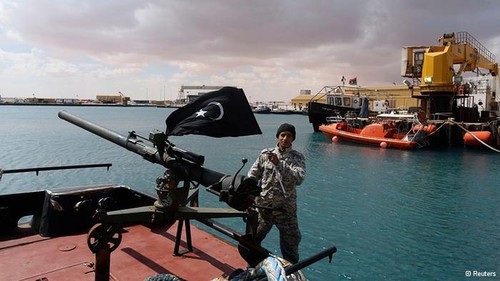(VOVworld)- 3 years after Libyan President Muammar Gaddafi was overthrown, Libya has not been able to find a way to stabilize the country. Libya is facing increasing widespread violence and clashes between the government and rebels. The situation in Libya in recent days, especially since the interim Parliament sacked the Prime Minister, has worried the international community.
 |
Libya’s General National Congress, the interim Parliament, on Tuesday dismissed Prime Minister Ali Zeidan after a no-confidence vote and named Defense Minister Abdullah al-Thani the caretaker Prime Minister. The vote was conducted following a confrontation in Tripoli between the central government and rebels over oil trading. Earlier, an oil tanker carrying rebel oil evaded warships and left the country. Mr. Zeidan’s government threatened to use force, even mobilize air strikes, to prevent the ship from escaping and carrying oil without the permission of Libya’s National Oil Group, but failed. This incident was the last straw, forcing Mr. Zeidan to leave office due to his ineffectiveness.
Ethic, regional and special interest conflicts
Since Mr. Zeidan took office in November 2012, his government has faced many difficulties. Zeidan is an independent politician who was supported by liberal parties, but not the opposition rebels, who have occupied most of the important ports and demanded political autonomy in the east. The Libyan government once considered the possibility of mobilizing the army to retake the ports from the rebels but feared that doing so would spark a new civil war and destroy oil facilities, already seriously damaged by the civil war 3 years ago.
3 years after Muammar Gaddafi was toppled, Libya’s government and Parliament are being severely criticized by Libyans for corruption and failure to improve people’s lives. Last month thousands of Libyans denounced Parliament’s decision to extend its tenure for another year. As a result, an early election was held on February 20th to set up a Constitutional Committee comprised of 60 members equally divided among three regions: Fezzan in the south, Tripolitania in the West and Cyrenaica in the East, with 6 seats reserved for the 3 main ethnic minority groups in Libya: Berbers, Toubous and Tuaregs. However, the election didn’t go smoothly in some areas and 13 of the 60 seats remain vacant.
Power vacancy in Libya
Prime Minister Zeidan is out but his replacement has not been decided yet. The public fears that instability will continue unless the Parliament reaches consensus on a successor. Libya’s political instability is obstructing international supports from countries wary of uncontrolled arms circulation.
A new election will soon be held but it will be difficult for Libya to achieve a stable political future without greater internal consensus.